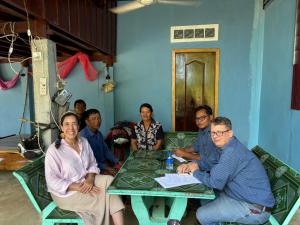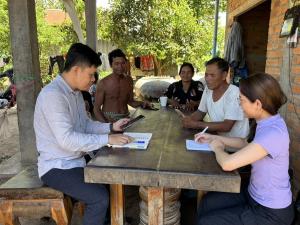Building the evidence base on the impacts of mobile financial services for women & men in farming households in Laos & Cambodia

Background
Since the 1970s, both for-profit and not-for-profit organisations have implemented a range of initiatives to provide formal financial services to farmers in low-income countries. Using mobile phones to deliver financial services to farming households is a rational solution that aims to uplift farmers from poverty, empower them to manage their finances better, and provide market information.
In Laos and Cambodia, agriculture continues to play a significant role in the economy, contributing 15% and 25% of each country’s GDP in 2019. However, low levels of productivity and adoption of agricultural technologies are prevalent in the sector. Farmers, particularly women, lack access to credit for investments in their farms and businesses.
Access to formal financial services remains low in both countries, especially in rural and remote areas. Nevertheless, the increasing availability of mobile telecommunications technologies in these areas prompts a new era of innovation in mobile-based financial services. These new digital financial services differ substantially from traditional microfinance, offering a wider range of services that are more accessible, posing new forms of risk, and user experience.
Digital finance is thought to be a critical enabler for agricultural development and poverty reduction. Mobile-based digital finance services (including credit, payments, remittances and insurance) may help farming households, and women in particular, to better manage their money and help improve their social and economic well-being.
Yet, while great claims are made about mobile finance as a critical enabling factor for agricultural development, little is known about how it affects the livelihoods and well-being of women and men in farming households.
Project objectives
This project aims to develop an evidence base on the economic and social impacts of mobile financial services for women and men in farming households with a particular focus on Laos and Cambodia.
Objective 1. Scientific. Build and analyse an evidence base for the social and economic impact of mobile financial services on women and men in farming households.
Objective 2. Scientific. Identify gaps in the evidence and in the methodological treatment of the evidence base; carry out mixed-methods research to fill these gaps in the contexts of Laos and Cambodia and, where viable, extrapolate these lessons to South East Asia and, where relevant, other country contexts.
Objective 3. Capacity building. Build the capacity of local partners in qualitative and quantitative research methods; produce knowledge products that help stakeholders better understand the impacts of financial services on women and men in farming households.
Objective 4. Innovation and next users. Present knowledge in such a way that stakeholders can use this evidence to a) make better decisions about how they engage with women and men in farming households; b) design and deliver more effective policies, programs, and products, and c) conduct more robust, gender aware, and context-relevant evaluations of the impact of financial services.
Project partners
Collaborating institutions:
- Centre for Global Food and Resources, University of Adelaide
- Institute for Culture and Society, Western Sydney University
- The University of Sydney
- National University of Laos
- Royal University of Phnom Penh
Funding:
- Australian Centre for International Agricultural Research (ACIAR), SSS/2020/160, May 2022- May 2027
Contact
GFAR researchers involved in this project:
Project materials, outputs and publications
Website: https://www.diffproject.org





